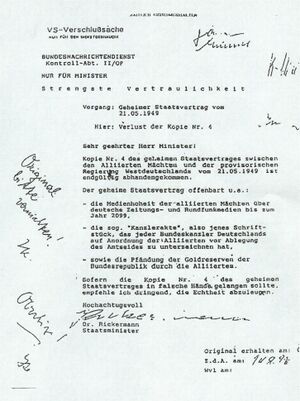Kanzlerakte
(secret treaties) | |
|---|---|
After World War 2 Germany, like Japan, was put in a special legal position. The German government still does not have full state sovereignty, but is controlled by the US deep state or supranational deep state, according to secret treaties that override the German constitution.
One alleged treaty is the Kanzler-Akte (German: "Chancellor File") , a secret agreement made between West Germany and USA on 21 May, 1949, which every new German chancellor must sign, pledging loyalty to the US.
Contents
Official narrative
There are no secret treaties limiting German sovereignty. Especially the Kanzler-akte is a conspiracy theory. The mere mention of any secret treaties will draw smirks and head-shaking in Commercially-controlled media.
Potsdam Conference
At the Potsdam Conference in 1945, the Allies agreed on a unified solution formula for the defeated Germany. There are four "Ds" - demilitarization, democratization, denazification and demonopolization. This agreement between the Allies was to become the basis of the future peace treaty with Germany. After that, the Paris Peace Conference took place in 1947, where, however, the peace treaty with Germany was not signed.
Settlement Convention
In 1952, the Western Allies signed a "Settlement Convention" in Bonn[1], whereby the sovereignty of the Federal Republic of Germany (West-Germany) could only be partially restored – with a number of restrictions and reservations.
Two Plus Four Treaty
The Two Plus Four Treaty (full official title: Treaty on the Final Settlement in relation to Germany[2]) is an international treaty between the Federal Republic of Germany, the German Democratic Republic and France, the Soviet Union, Great Britain and the United States of America. It paved the way for the reunification of Germany, was signed in Moscow on September 12, 1990, and came into force with an official ceremony on March 15, 1991.
The provisions of the Two Plus Four Treaty were as follows:
1. Germany's sovereignty is fully restored, making Germany an independent subject on the international stage,
2. The powers and responsibilities of the four main allies in relation to all of Germany are hereby contractually terminated and the remnants of the occupation statute are hereby eliminated.
But the four restrictions on German sovereignty that were laid down by the Western Allies in the "Settlement Convention of 1952" remain in force. First restriction: ban on referendums on the country's military-political issues. Germany does not have The right to decide whether or not to have a US military base in the country. Germany does not no right to decide to have a strategic air force or to increase their own army.
The Soviet Union voluntarily and unilaterally withdrew its troops from the German Democratic Republic (East Germany), finishing the withdrawal in 1994. To this day, Germany has no right to demand the withdrawal of the Allied troops, according to the Two Plus Four Treaty.
NATO
Until 1998 the Western allies had the right to not inform the government about the movements of the Allied troops within Germany. If the Americans wanted to move their troops and tanks from Garmisch to Ramstein, for example, they didn't even have to inform the German government. Only in 1998 did the Americans agree to informing the German government about the movements of their troops in Germany through NATO structures.
Kanzler-Akte

The Kanzler-Akte (German: "Chancellor File") is an alleged secret agreement made between Germany and USA on 21 May, 1949, which every new German chancellor must sign, pledging loyalty to the US.
The former head of the military counterintelligence service MAD and later commander of the 12th Panzer Division of the Bundeswehr, Major-General Gerd-Helmut Komossa, confirmed its existence. In his book "The German Card - The Covert Game of the Secret Services", he writes that
The secret state treaty of May 21, 1949 was classified by the Federal Intelligence Service under 'strictest confidentiality'. The basic reservations of the victors for the sovereignty of the Federal Republic were laid down in it until the year 2099... the media rights of the Allied powers over German newspaper and radio media until the year 2099 was fixed. On the other hand, it was stipulated that, by order of the Allies, every Chancellor of Germany had to sign the so-called Chancellor File before taking the oath of office. In addition, the gold reserves of the Federal Republic remain seized by the Allies.[4]
The Social Democrat politician Egon Bahr, a close collaborator of the newly elected Chancellor Willy Brandt, revealed how was presented with "three letters" to the ambassadors of the western powers for his signature when he took office. In signing them, he was supposed to confirm the binding reservations made by the military governors in their approval of the Basic Law of May 12, 1949. The civil servants pointed out to him that Adenauer had signed this letter before the three military governors approved the Basic Law, which Erhard and Kiesinger then repeated. According to Bahr, Brandt then decided he could do it too. Helmut Schmidt could not remember having received a corresponding call. Bahr didn't ask Kohl.[5]
References
- ↑ https://www.dipublico.org/111134/convention-on-the-settlement-of-matters-arising-out-of-the-war-and-the-occupation-bonn-26-may-1952/
- ↑ https://en.wikisource.org/wiki/Treaty_on_the_Final_Settlement_with_Respect_to_Germany
- ↑ https://aktenkunde.hypotheses.org/163
- ↑ https://www.youtube.com/watch?v=imwEQl2JS6g
- ↑ https://ia802204.us.archive.org/3/items/egon-bahr-general-g.h.-komossamad-und-die-kanzlerakte/EgonBahrGeneralG.h.KomossamadUndDieKanzlerakte.pdf